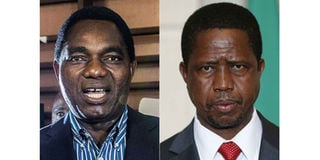Why presidential elections tend to be two-horse races

Zambia's presidential candidate Hakainde Hichilema and incumbent president Edgar Lungu.
What you need to know:
- While Edgar Lungu and Hakainde Hichilema won 50.35 per cent and 47.67 per cent of the Zambian vote, respectively, on August 11, the third-placed candidate, Edith Nawakwi, secured a pitiful 0.65 per cent.
- A similar, if less extreme, picture emerged in Uganda in February.
- Kenya’s recent history provides yet another example.
Zambia’s general election of August 11 provides a reminder of several notable trends in polls across Africa.
First, it provides yet another example (if one was needed) of how difficult it is to oust an incumbent – as Edgar Lungu scraped over the 50 per cent barrier to win the election in the first round amid claims of widespread irregularities and collusion between the government and the Electoral Commission of Zambia.
Second, it reminds us of the extent to which presidential elections tend to be a two-horse race, which pit an incumbent, or establishment candidate, against a prominent opposition leader.
While Mr Lungu and Hakainde Hichilema of the United Party for National Development won 50.35 per cent and 47.67 per cent of the Zambian vote respectively, the third-placed candidate, Edith Nawakwi, secured a pitiful 0.65 per cent of the popular vote.
A similar, if less extreme, picture emerged in Uganda in February. In that election, President Yoweri Museveni was returned with 60.62 per cent of the popular vote, while veteran opposition politician Kizza Besigye, secured an impressive 35.61 per cent. In contrast, the third candidate, Mr Amama Mbabazi, won a mere 1.39 per cent.
Kenya’s recent history provides yet another example.
In 2013, Mr Uhuru Kenyatta was announced the winner with 50.51 per cent, while Mr Raila Odinga was confirmed the principal opposition leader with 43.7 per cent, leaving Mr Musalia Mudavadi a distant third with 3.96 per cent.
SERIOUS POLITICIANS
In all of these cases, third candidates have been serious politicians. Ms Nawakwi was a former minister, and Mr Mbabazi a former Prime Minister and National Resistance Movement insider, who was generally recognised for having been one of Uganda’s most powerful politicians.
As late as November 2012, Mr Mudavadi looked as if he might be the establishment’s favoured candidate. Mr Mudavadi was then joined by other seasoned politicians such as Mr Peter Kenneth and Ms Martha Karua, who both enjoyed an impressive track record, a national profile, and significant media coverage, but failed to obtain even 1 per cent of the popular vote.
So, why do third candidates perform so poorly?
Dr Dominic Burbidge, a political scientist at the University of Oxford, provides some interesting insights in his study of how many middle-class Kikuyu voters, who were initially supportive of Mr Kenneth, ended up voting for Mr Kenyatta.
According to Dr Burbidge, Mr Kenneth and Ms Karua were widely perceived as “fresh options, able to turn Kenyan politics into a new direction”.
However, as the election neared, voters felt pressurised into voting for Mr Kenyatta – as a vote against the International Criminal Court and in defence of Kenya’s sovereignty, but also a way to block Mr Odinga.
As Dr Burbidge notes: “Seeing themselves as members of an apathetic and uninfluential class led (his interviewees) to feel politically homeless, restricted to choosing the lesser evil between two main candidates”.
PERSUADE RESIDENTS
This echoes my own research in the Rift Valley, which shows how the Jubilee alliance managed to persuade the majority of residents – both Kalenjin and Kikuyu – to vote for “UhuRuto” and against Mr Odinga.
As a result, voting patterns were as much about what the American political scientist Susanne Mueller has called “exclusionary ethnicity”, or “who would not get power and control the state’s resources”, as it was about “speculative loyalty” or a calculation of the potential advantages of electing community spokesmen.
A similar logic was evident in Uganda, where, as the election approached, and Mr Museveni and Dr Besigye became the front runners, support for Mr Mbabazi began to collapse.
The main reason: as it became clear that Mr Mbabazi had little chance of winning, a vote for him came to be seen as a wasted vote that might allow the politician that one did not want – be it Museveni or Besigye – to win.
The lesson for those who seek to stand against Mr Kenyatta and Mr Odinga in next year’s election is a dispiriting one. In short, it is that, even if people think you are the best candidate, they are unlikely to vote for you if they feel that you are unlikely to win and fear either a Kenyatta or Odinga victory.
As long as voting continues to be as much about trying to ensure the “other” does not win, as it is about trying to ensure one of your “own” gets into power, third-place candidates look set to continue to enjoy a tiny fraction of the popular vote.
Gabrielle Lynch an associate professor of comparative politics at the University of Warwick in the UK; [email protected]; @GabrielleLynch6.





